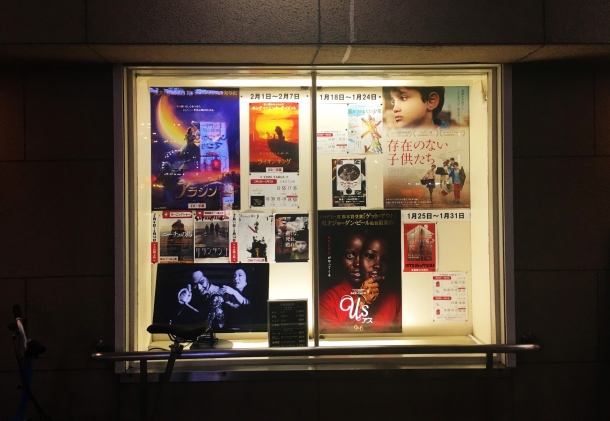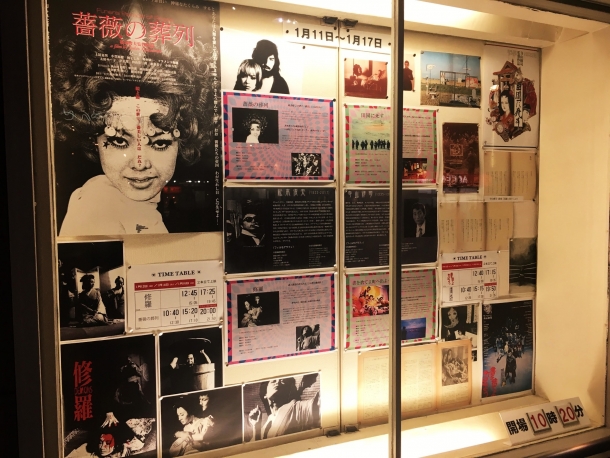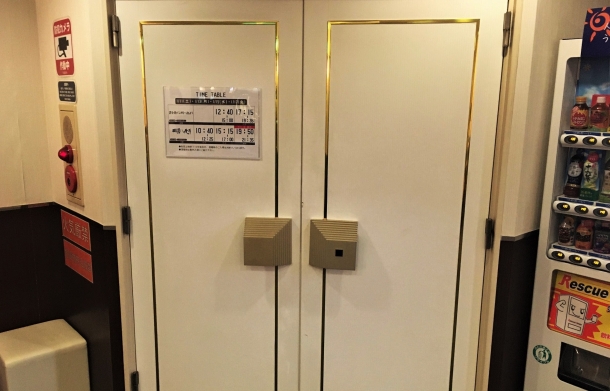Waseda Shochiku: Arthouse cinema at your fingertips
Fri, Feb 14, 2020-
Tags

Japan has an impressive film history of over 100 years and so many notable Japanese directors have made a mark on the international film community. Tokyo, in particular, also has a large film scene and has countless movie theaters that vary from advanced state-of-the-art facilities to small, arthouse theaters. The latter is my favorite type of theater and as a Waseda student I was ecstatic to find one on the well-known “Baba Aruki” (the popular street that connects Waseda Campus to Takadanobaba). After class one day, I stopped by for a double feature of High Life and First Reformed. I loved both of these films so much already but I never had the opportunity to watch them on the big screen. I purchased my ticket and a coffee from the vending machine and had time to look around the theater lobby. There were billboards and displays of information about the films they were screening as well as a wall of flyers for upcoming films. They also had information of other independent cinemas that were going to have retrospectives later that month and I found the information to be resourceful. Soon it was announced that the film would begin shortly and I took my seat in the theater. I was surprised at the size of the theater and the quality of sound and projection. Although I had watched both films, watching alongside others in the theater provided a new experience. I could feel other’s responses as we all sat in that dark room and experienced something new together. The movie going experience is so special to me and I was so happy to have found an independent cinema so close to Waseda Campus.
Waseda Shochiku was built in 1951 and was originally founded by a former employee of the well-known Shochiku Film Company. They have been proudly screening films for over 50 years now and next year they are coming up on their 70th anniversary since being founded. A small team of three manages and programs the films being screened. Simply put, the job of a programmer is to select the films that will be projected in a theater but there is so much more to the job than just that. A film programmer also acts as a curator who selects films that are socio-culturally worth watching and can open the viewers’ eyes to new things. This job requires a vast film knowledge and sense of what is both historical and relevant. Waseda Shochiku does this time and time again with carefully selected retrospectives and films that attract film enthusiasts and regular movie goers alike.

One of the people we have to thank is the program director, Mr. Masayuki Ueda, and I was lucky enough to ask him a few questions with the help of my trusty friends, Reren and Google Translate. I began by inquiring about the programming and what goes into making the decisions about which films will be shown. Mr. Masayuki replied that whether it is a film he enjoys or one that he has never seen before, it is important that the film being shown inspires audience members to watch more films. He also believes it is important to select films without bias and this is apparent in the wide and eclectic selection of films shown at Waseda Shochiku. Even within the month of February, the selection of films come from countries all around the world including Hungary, Russia, China, France and the United States. The films shown at Waseda Shochiku are not genre specific and feature both contemporary films and classics. There is something for everyone and there is always something new to discover.
Nowadays, films are accessible on any device and most people enjoy movies from their phones or laptops. There is nothing wrong with enjoying films from home but there is something really special about going to the cinema to watch a film. Mr. Masayuki, program director, explains that “most films are made with the theater viewing in mind”, especially for films that pre date computers and DVD players. When these filmmakers were creating the styles and techniques to make their ideas come to life, they had to seriously consider the movie theater experience because they knew that is how everyone would experience the film. Mr. Masayuki explains that movie theaters have many strict standards for sound and color display to ensure that screenings are in line with the intentions of the original filmmakers as much as possible. I think it is so beautiful that theaters like Waseda Shochiku, feel a responsibility to respect and uphold the integrity of a film. It allows audience members to feel attached and connected to the film art they are consuming and appreciate the film even more than they would on a phone or computer.

Another fascinating and intriguing aspect of watching films in a movie theater is the fact that it’s a community experience. Mr. Masayuki explains that there are many surprises and reactions you cannot experience on your own. When you are surrounded by a large audience in a movie theater, you can sense their reactions; whether they are repulsed, laughing or crying. He says, you can either empathize with the reactions of your neighbors or repel them but either way, it is a unique experience shared with strangers. This comment really resonated with me because I believe humans are social creatures and we are sensitive to those around us. I have had so many beautiful experiences of silent connection with strangers whether we are laughing our hearts out next to each other or crying silently. I can’t think of many places that replicate the experience of watching films in a theater and I often go alone because it is my favorite place to be.
There are great theaters in Tokyo to experience the big blockbusters but Waseda Shochiku is a great place to go if you are interested in exploring more independent World Cinema. An independent film is a film that is produced outside of a major film studio system. This also means more freedom because they often showcase the filmmaker’s artistic vision with less boundaries. Since independent films often have smaller budgets, this can lead to more creative decisions to make the most of the limited resources available. Mr. Masayuki explains that independent films can be especially reflective of the artist’s philosophy, methods and surroundings rather than commercial or economic value. Mr. Masayuki hopes that students and all kinds of people explore independent cinema and explore new things. The films showcased can introduce audiences to domestic stories that take place in Japan or foreign films that introduce them to worlds unknown.

The best part? As a student, there is a discount and every ticket you buy (1100 Yen) includes the viewing of two films. The paired films are complementary to one another and if you need to leave the theater between films, you ask for an admission pass at the information desk. There is also always a discount for “Movie Day” (the first of each month) and the “Last Ippon” (Last film showed that day) for only 800 Yen. Movie theaters can be so expensive and that deters people from going but at Waseda Shochiku, you can watch two films for the price of one. I strongly urge you to take advantage of this amazing resource that it is within walking distance of campus and discover something new and exciting.
Waseda Shochiku is conveniently located at 1-5-16 Takadanobaba, Shinjuku-ku, Tokyo and is easily accessible by JR, Seibu Shinjuku Line, Tozai Line and Fukutoshin Line (Nishi-Waseda).
For more information, please visit their website: http://wasedashochiku.co.jp/english
*This article was written and contributed by the following student.
Student Contributor
Menen Basha
Exchange Student from California State University, Northridge
(Currently studying at Waseda’s School of Political Science & Economics)














